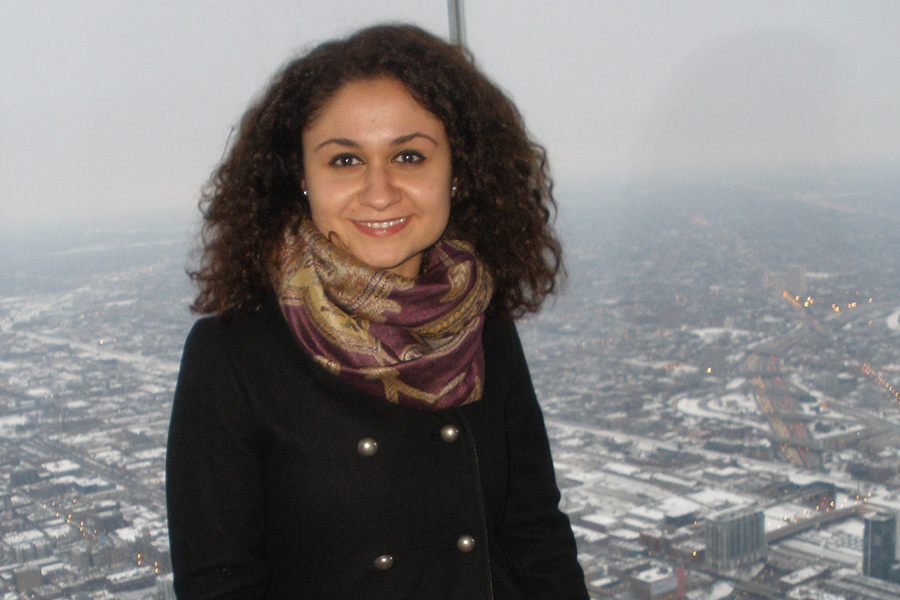
How a Graduate Degree in Neural Computation Prepares for Career in Medtech
By Stefanie Johndrow
After graduating with a Ph.D. in neural computation from Carnegie Mellon University’s Center for the Neural Basis of Cognition (CNBC) in 2014, Kubra Komek made the switch to the medtech industry.
Komek’s degree comes in handy every day as a regional clinical research manager for the Middle East, Africa, Central Asia and Turkey. Komek manages the execution and regional strategy of clinical studies at Medtronic and plays a role in connecting local commercial teams with clinical teams to disseminate the clinical evidence of their therapies more effectively. She also develops expertise in cardiovascular, neuromodulation, diabetes and surgical therapies.
The CNBC is a joint center between the University of Pittsburgh and CMU that trains the next generation of neuroscientists through an interdisciplinary graduate and postdoctoral training program and fosters close collaborations between faculty. The center integrates Pitt’s strengths in basic and clinical neuroscience with CMU’s strengths in psychology, computer science, biological sciences, engineering and statistics.
What were your career goals before attending the CNBC program? Why did you choose to attend the program?
I have been interested in healthcare industry from my undergraduate years, which is why I did a summer internship at Novartis. I really enjoyed my internship experience and learned a lot about how a pharmaceutical company runs clinical studies to bring new drugs to the market. However, I was also passionate about neuroscience—which is why I came to the United States for college from Turkey. Therefore, when I started at the CNBC, I knew that I was going to move back to the healthcare industry after I completed my degree. The offerings from CNBC were perfect for me: The opportunity to work on building computational models to investigate the neural basis of schizophrenia by working with a mathematician and a psychiatrist. I could not have asked for a better program than the Program for Neural Computation (PNC) for my Ph.D.
Since you’ve made the switch to the medtech industry, what advice do you have to students looking to do the same?
Even at the beginning of my Ph.D., I knew that I wanted to move to industry after completing my degree. Although I love academic research, I was always more interested in utilizing the skillset that I’ve acquired during my formal training at CNBC in a more industrial setting to drive research and innovation. For this reason, I was actively involved in learning more about industry opportunities for Ph.D. candidates and even helped organize a panel with my fellow CNBC colleagues to invite CNBC alumni who were currently working in industry to share their experiences with us. I would recommend those who are interested in moving to industry to be very proactive in their job search by networking and reaching out to people with similar backgrounds to get advice on how they should proceed. The sooner they start to look into this, the better it would be as building connections takes time. They can definitely reach out to me.
What's next for you?
I want to develop further in my current role in the medtech industry and combine my analytical background in creating innovative solutions for the healthcare industry. My current focus is on driving value-based healthcare initiatives in my region to support the healthcare industry transition from a volume-based system to one that takes health outcomes into account in payment structures.
Are there any professor or mentors from the CNBC program who helped you reach certain feats?
My advisers Raymond Cho, then of the University of Pittsburgh, and Bard Ermentrout, University Professor of Computational Biology at the University of Pittsburgh, were of great support during my Ph.D., I am thankful to both of them for their continued support and mentoring. As my research focused on computational models for schizophrenia, I was privileged to be mentored by a mathematician and a psychiatrist. This gave me the opportunity to combine clinical and quantitative analyses and communicate complex phenomena to audience with different backgrounds more effectively. Being part of a large CNBC department was also great in terms of giving me the networking opportunities with faculty, staff and students from different departments. CNBC is truly an excellent center driving innovative brain research.